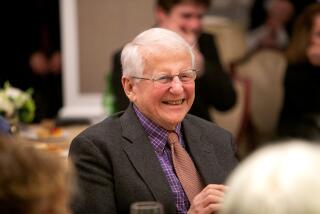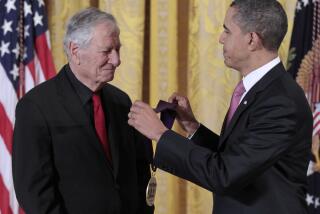THEATER : Famed Theorist Issues Call to Revive Ensemble Company : Jerzy Grotowski urges universities to keep actors together longer. Extra rehearsal time, he says, can mean the difference between a draft and a work of art.
- Share via
IRVINE — Enigmatic drama theorist Jerzy Grotowski, in a rare public lecture Sunday, called on universities to rescue the idea of ensemble theater.
At UC Irvine, addressing his audience in halting English, the Polish-born director, who founded the influential Polish Laboratory Theatre in the 1960s, called for a new commitment to Konstantin Stanislavsky’s theories of ensemble, which he said have been all but abandoned by American commercial theater.
Standard rehearsal time of three to four weeks is simply inadequate, he said, adding that companies should stay together for several years at least, with a minimum of three months’ rehearsal for a single production.
A one-month rehearsal period allows the actors no time for “personal artistic discovery. It seems to me totally absurd,” he said. “Rehearsals are the terrain of discovery.” He said the result of extra rehearsal time is comparable to the difference between a draft and a finished painting.
The publicity-shy Grotowski, who spends most of his time in Italy, has been coming to UCI to conduct a master class for a few weeks each year since 1986; he was at UCI full time from 1983 to 1986, conducting research. The 56-year-old, hair and beard shaggy and gray, took off his sport jacket and pulled on a brown woolen poncho before beginning his speech here.
He noted that while Stanislavsky’s ideas, formulated in the late 19th Century, are still a mainstay of university classroom teaching, they often are not applied in the real world of American commercial theater.
This, he continued, may be because American theater, unlike European theater, exists largely without government subsidy and therefore may find it difficult to accommodate the kind of time frame that Grotowski feels is needed to produce meaningful drama.
However, he said, universities may provide the ideal environment.
“You can create within the time of study something that works like ensemble,” Grotowski said.
“You have the structure. You should do something with the structure,” he added.
Much of Grotowski’s work at UCI has centered on his research into the relationship between theater and ritual, highly theoretical work that he puts into practice in Pontadera, Italy, where he leads small groups of actors, working with scraps of ancient text, in experiments with theatrical forms.
The experiments are not designed for public performance, although in recent years Pontadera has played host to visiting theatrical ensembles that come to observe and interact with Grotowski’s students.
Grotowski’s Polish Laboratory Theatre, with which he made his mark, dissolved in 1984 after 25 years. His 1968 book, “Towards a Poor Theatre,” has become a classic of dramatic theory.
His productions often involved extensive reconstruction of a play’s text, and his actors underwent rigorous training that produced a performance style combining discipline and precision with spontaneity--a balance that Grotowski said grows out of a complete absorption in the craft.
“Improvisation is not chaos, it is not anarchy. It is mainly adjustment,” he said Sunday. Grotowski has been criticized for abandoning public performance for theoretical work that sometimes is arcane, but he defended himself with an analogy: “Some monasteries,” he said, “are needed to keep the religion alive.”
More to Read
The biggest entertainment stories
Get our big stories about Hollywood, film, television, music, arts, culture and more right in your inbox as soon as they publish.
You may occasionally receive promotional content from the Los Angeles Times.










